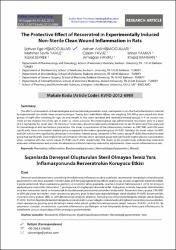The protective effect of resveratrol in experimentally induced non-sterile clean wound inflammation in rats

View/
Access
info:eu-repo/semantics/openAccessDate
2013Author
Hişmioğulları, Şahver EgeHişmioğulları, Adnan Adil
Yavuz, Mehmet Tevfik
Yavuz, Özlem
Yaman, İsmail
Seyrek, Kamil
Hayırlı, Armağan
Rahman, Khalid
Metadata
Show full item recordAbstract
Deneysel steril olmayan temiz yara tekniği ile indüklenmiş inflamasyona sahip sıçanlarda, resveratrolün hematolojik ve biyokimyasal parametrelere olan etkisi araştırıldı. Yirmidört adet, 250-300 g ağırlığında Wistar-Albino sıçanları; yaş, cinsiyet ve ağırlıkları eşleşecek şekilde, 3 gruba yerleştirildi. Sham-operasyonu geçirmiş ve resveratrol almış gruplarda, sıçanların median hattı boyunca 4 cm’lik bir ensizyon yapılarak yara oluşturuldu. Resveratrol, 7 gün boyunca, 0.5 mg/kg/gün dozunda verildi. Yedi günün sonunda, hayvanlar öldürülmeden önce kan numuneleri alındı ve hematolojik ile biyokimyasal parametreler yönünden analiz edildi. Resveratrol almış grupta; CRP, WBC ve LDH gibi yangı belirteçleri, sham-operasyonu geçirmiş grup ile karşılaştırıldığında belirgin olarak düşüktü (P<0.05). Benzer şekilde, resveratrol almış grubun, WBC ve LDH aktivitelerinin ortalama değerleri, kontrol grubu ile karşılaştırıldığında, belirgin olarak düşüktü (P<0.05). Kontrol değerleriyle karşılaştırıldığında, resveratrol almış grup, belirgin olarak daha düşük trigliserid konsantrasyonuna sahipken, sham-operasyonu geçirmiş grup da belirgin olarak daha yüksek glukoz konsantrasyonuna sahipti (sırasıyla, P<0.001 ve P<0.05). Bu çalışmanın sonuçları, resveratrolün sıçanlarda inflamasyonu zayıflattığını ve kan kimyasında deneysel temiz yara inflamasyonu ile indüklenme sonucu oluşan değişiklikleri onardığını göstermektedir. The effects of resveratrol on haematological and biochemical parameters were investigated in rats that had inflammation induced by experimental non-sterile clean wound technique. Twenty four male Wistar-Albino rats weighing 250-300 g were placed into three groups of eight after matching for age, sex and weight. In the sham-operated and resveratrol-treated groups, a 4-cm incision was made on the median line of the rats in order to create a wound. Resveratrol group was administrated resveratrol daily at a dose of 0.5 mg/kg/day for seven days. At the end of seven days, blood samples were obtained prior to sacrification and then analysed for hematological and biochemical parameters. The mean concentration of the inflammatory markers as CRP, WBC and LDH were significantly lower in resveratrol-treated group compared to the shame-operated group (P<0.05). Similarly, the mean values for WBC and LDH activity were significantly decreased in resveratrol-treated group compared to the control group (P<0.05). Resveratrol-treated group had significantly lower triglyceride concentration whereas sham-operated group had significantly higher glucose concentration when compared with the control values (P<0.001 and P<0.05, respectively). The results of the present study indicate that resveratrol attenuates inflammation and restores the alterations in blood chemistry induced by experimental clean wound inflammation in rats.

















